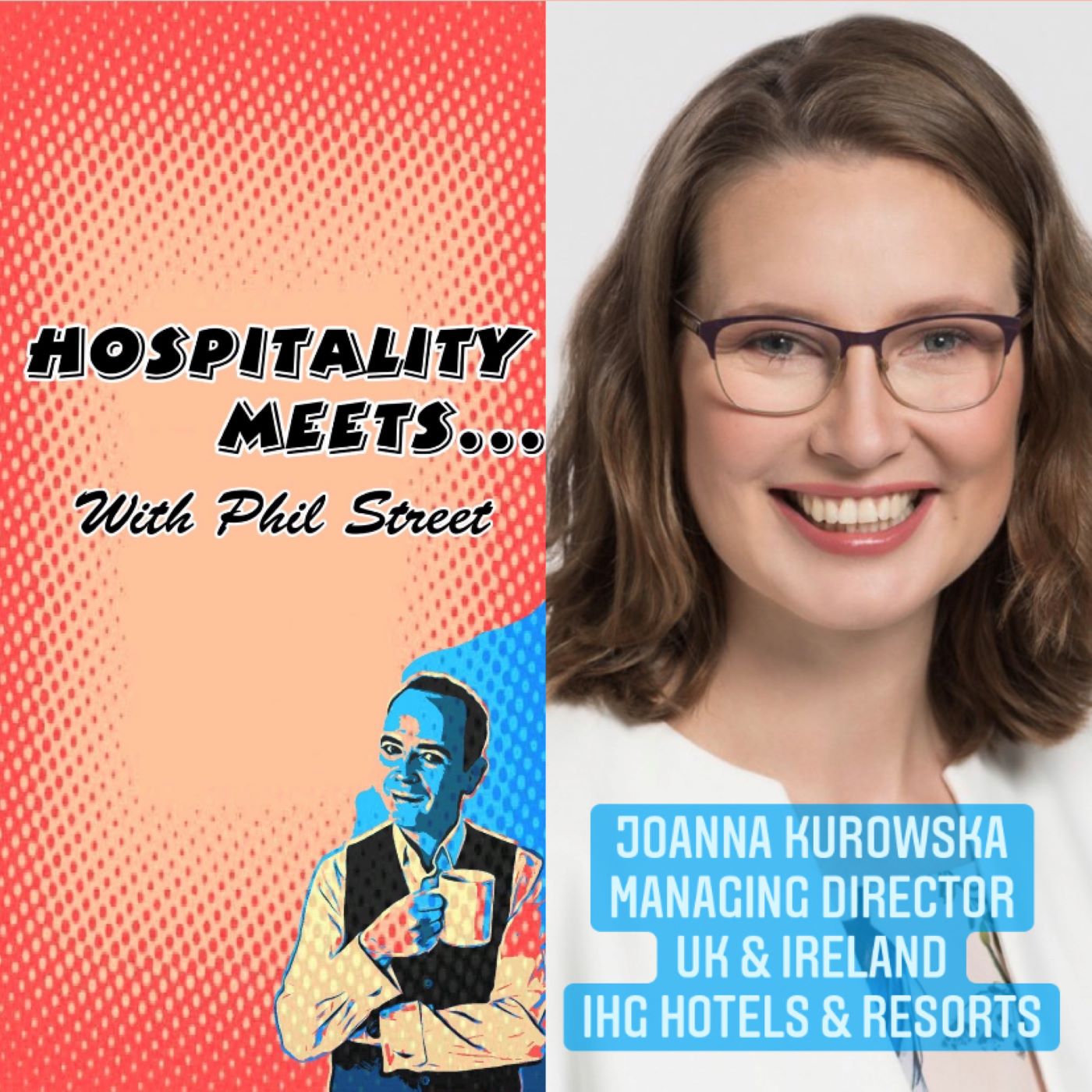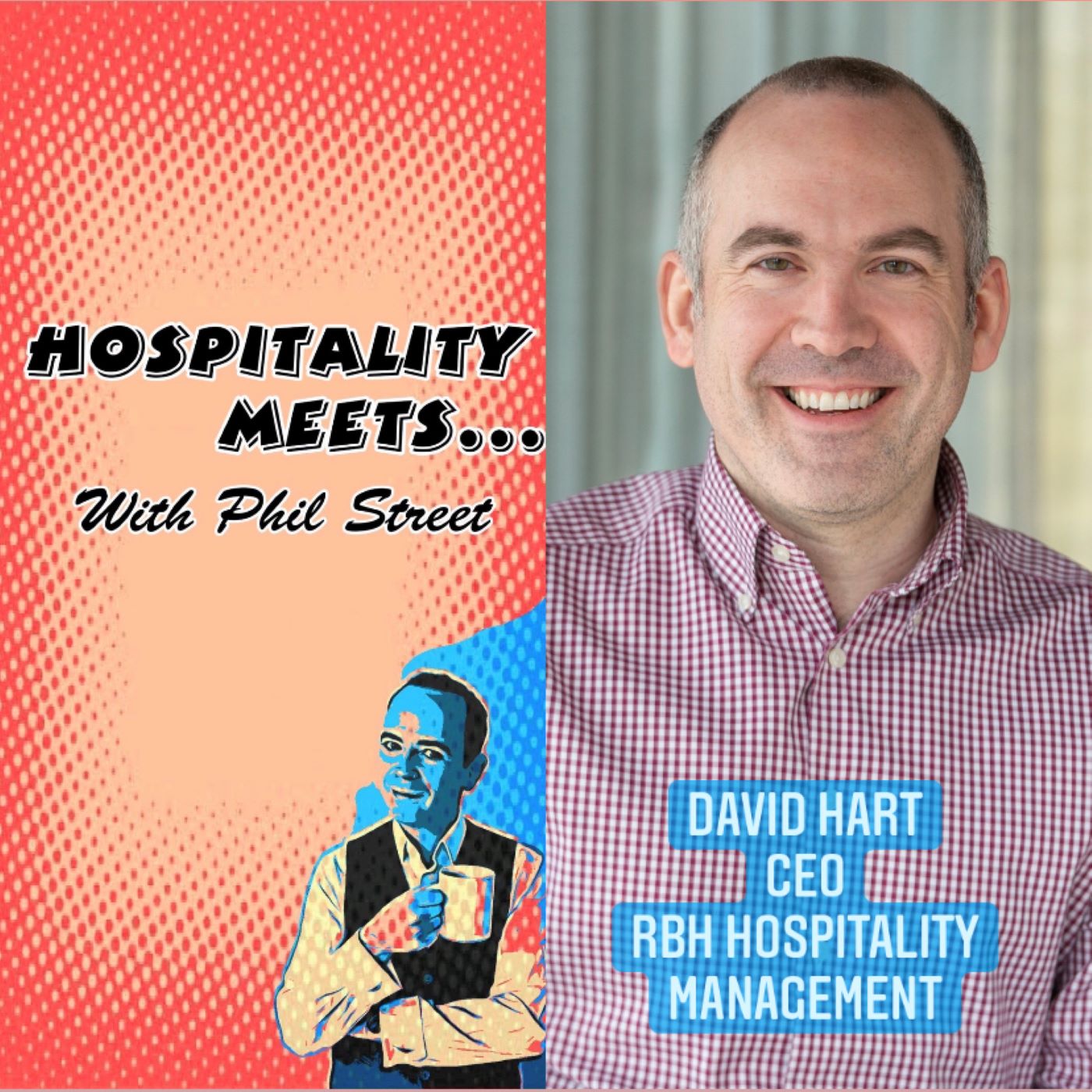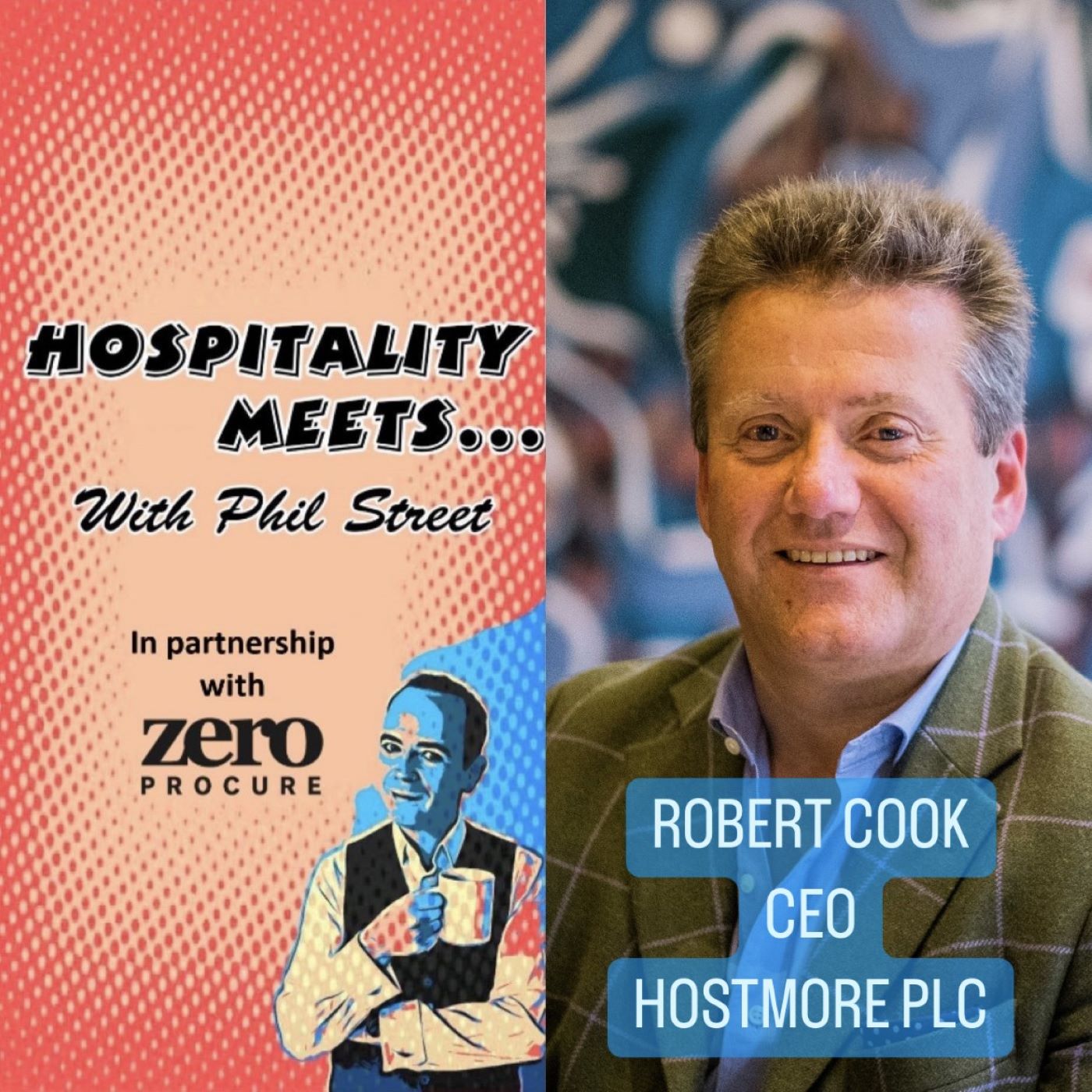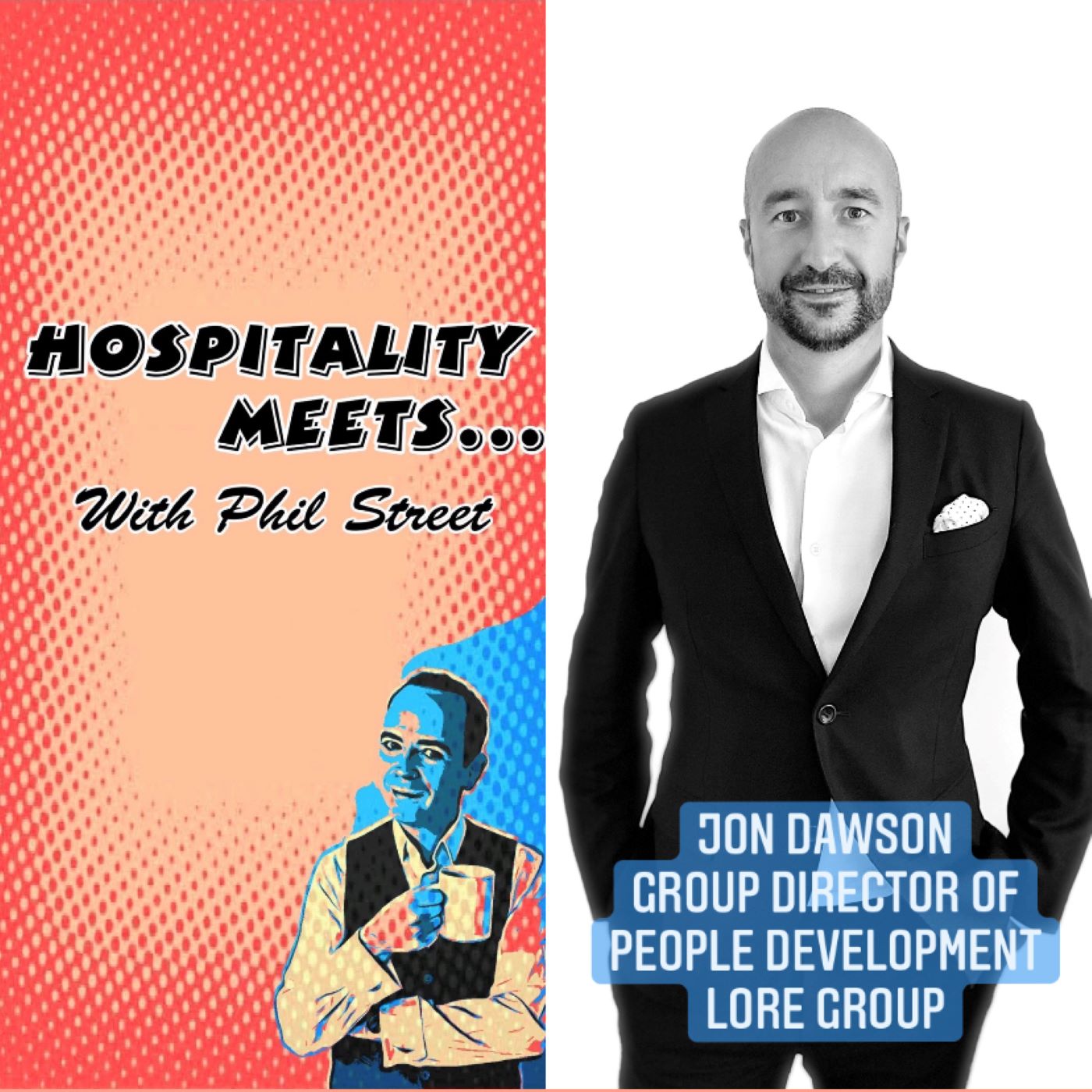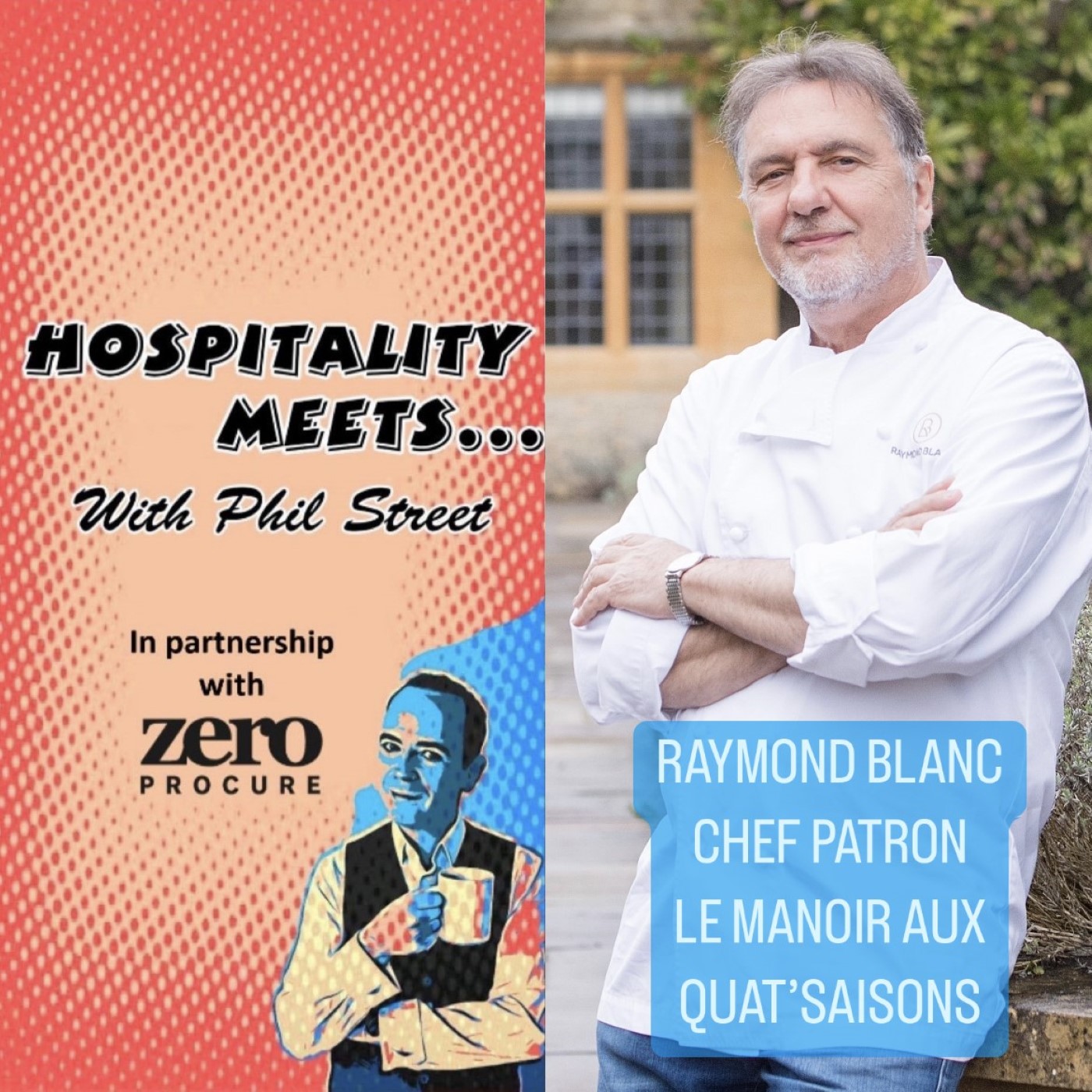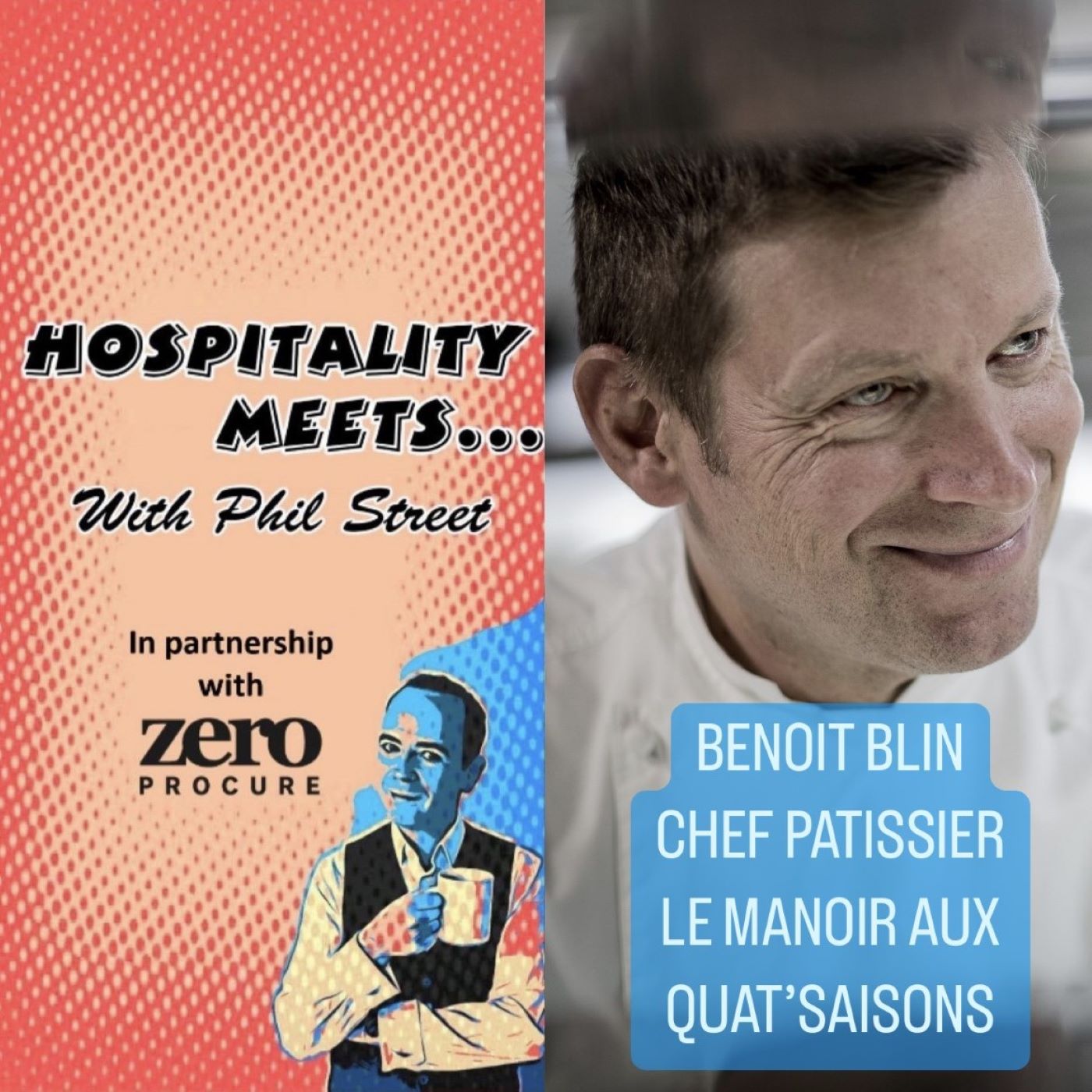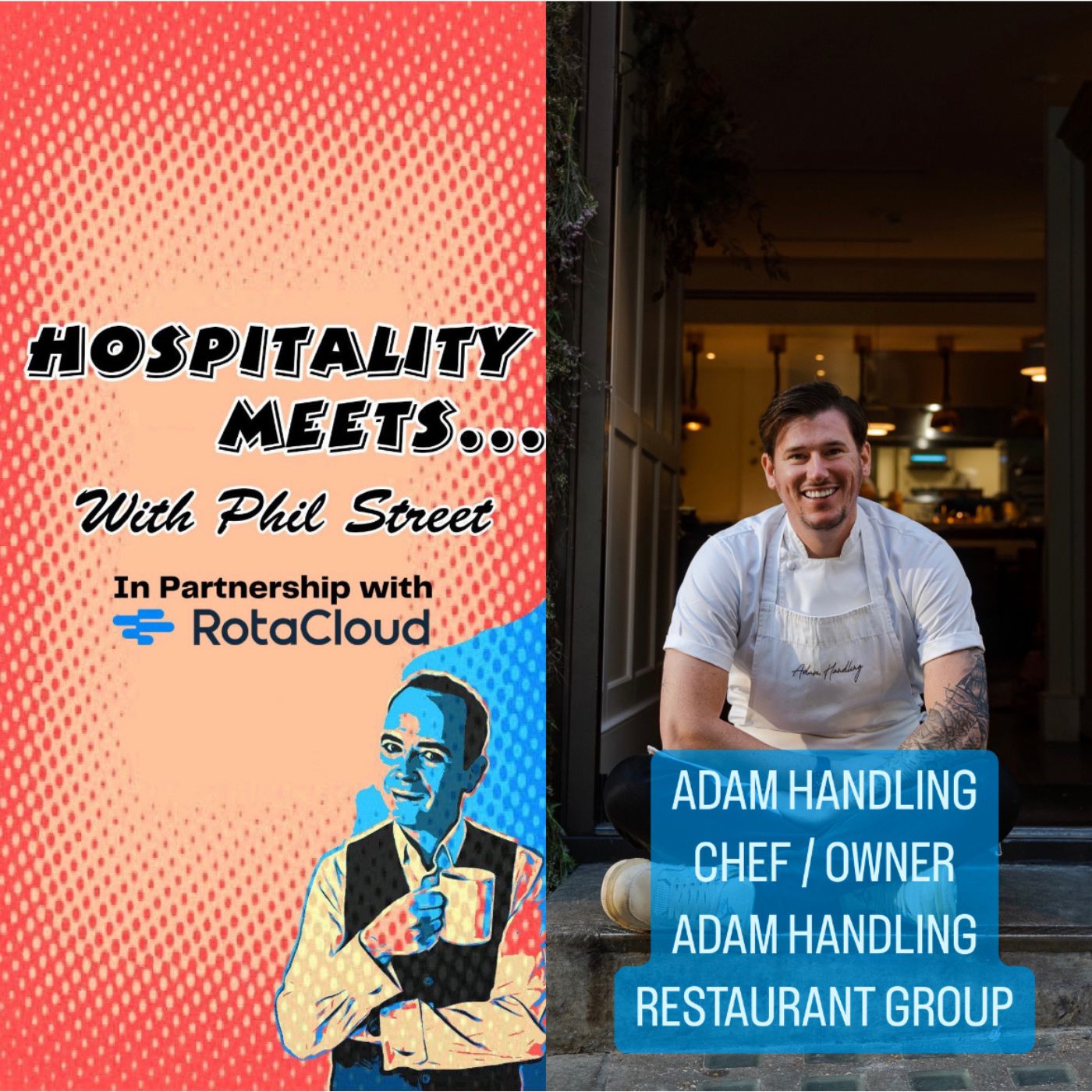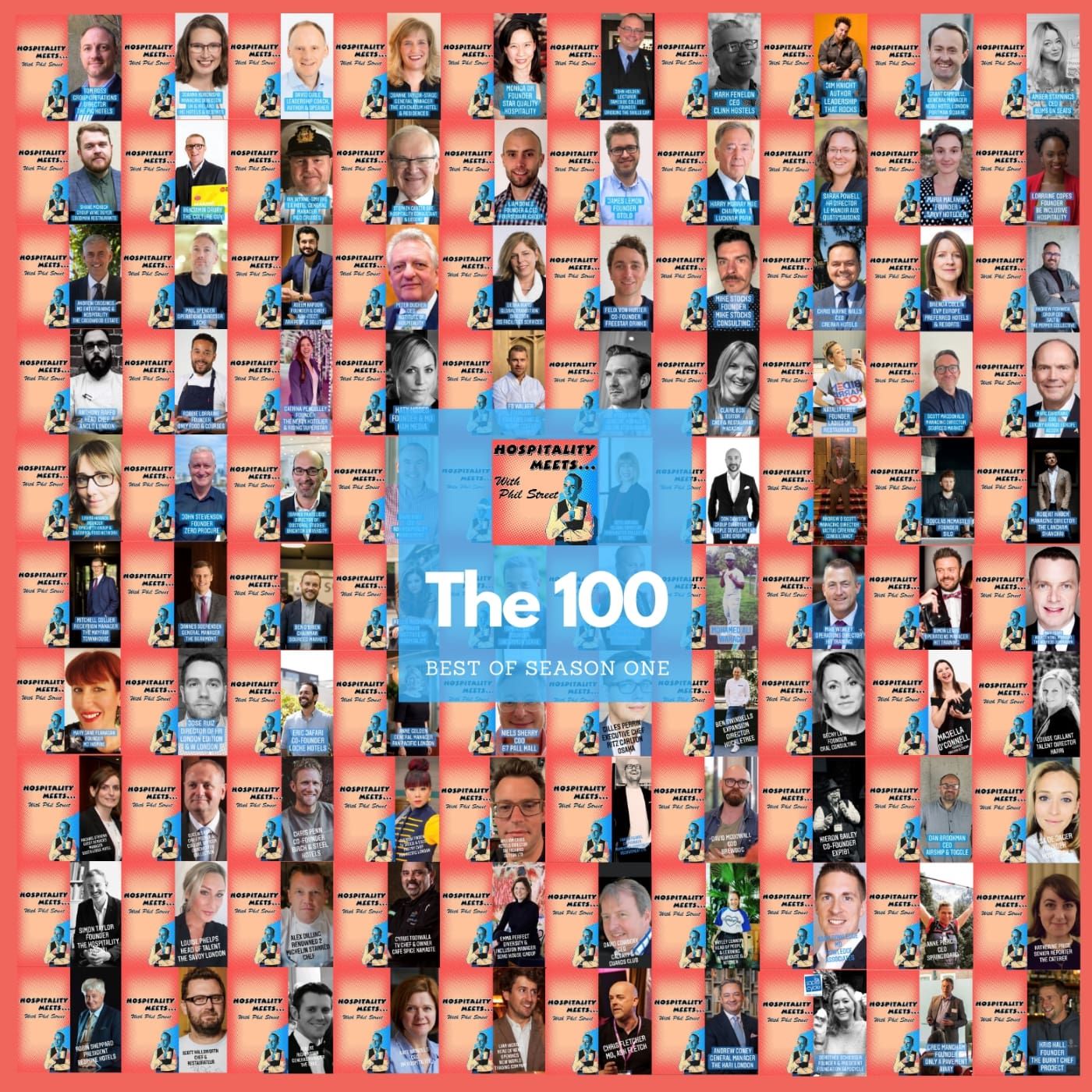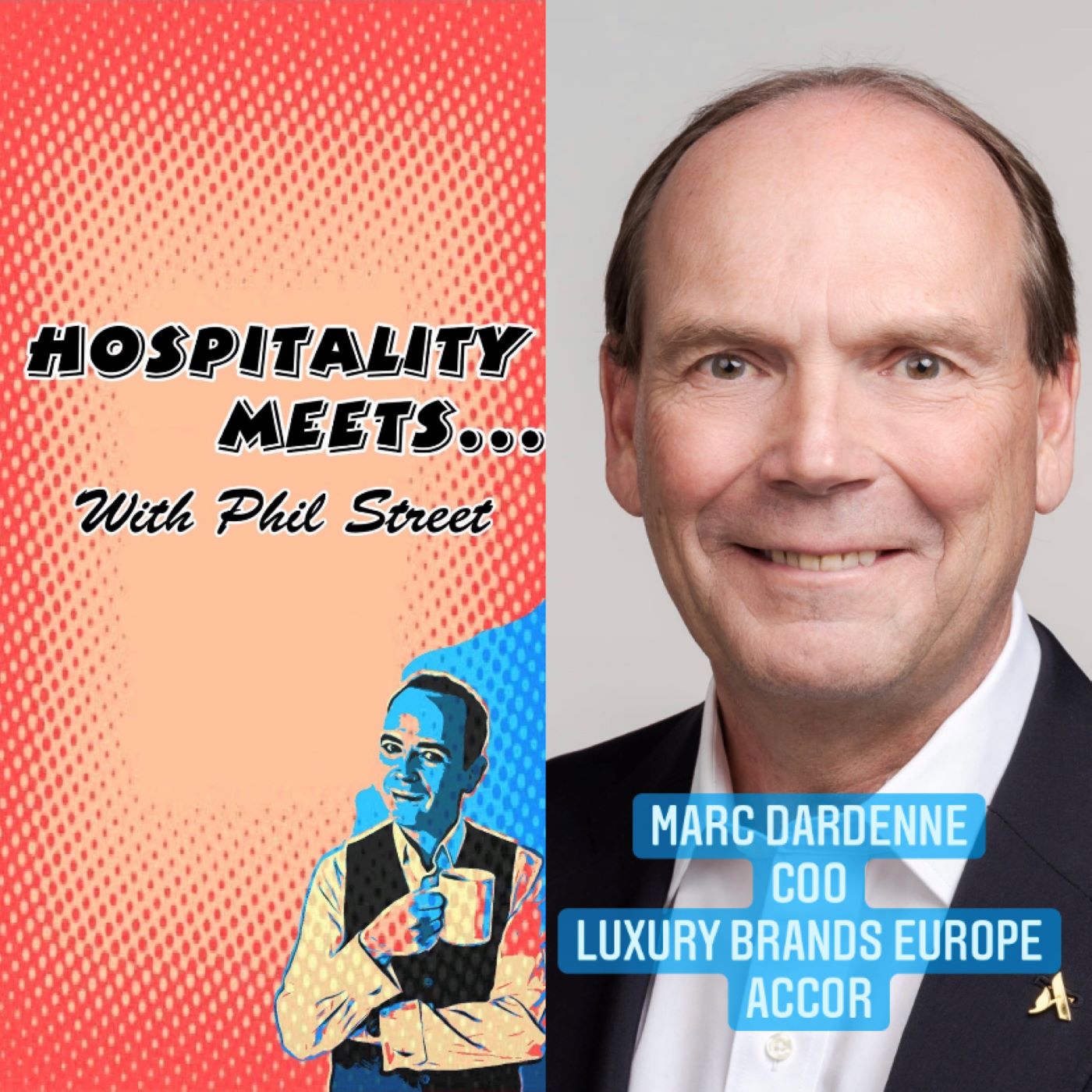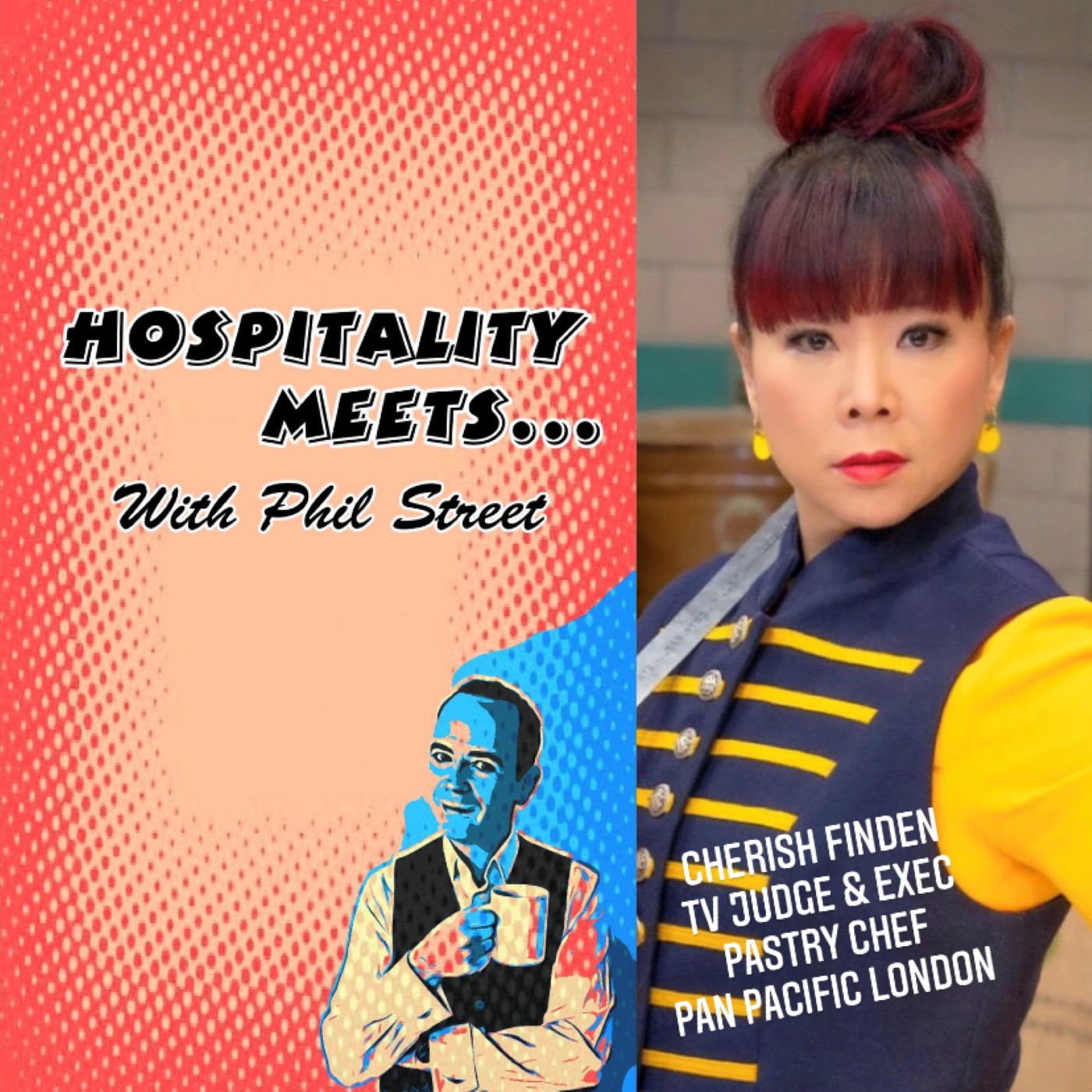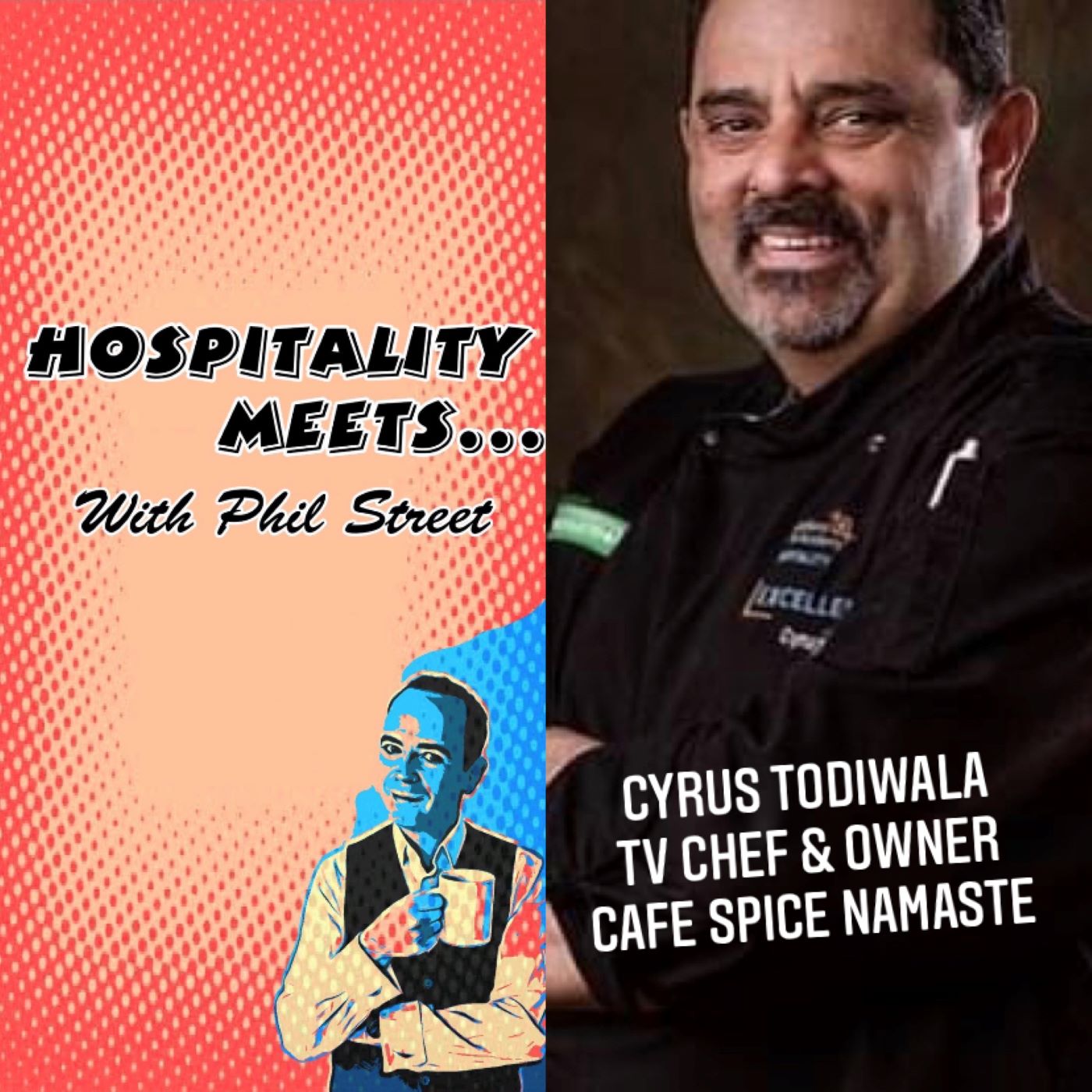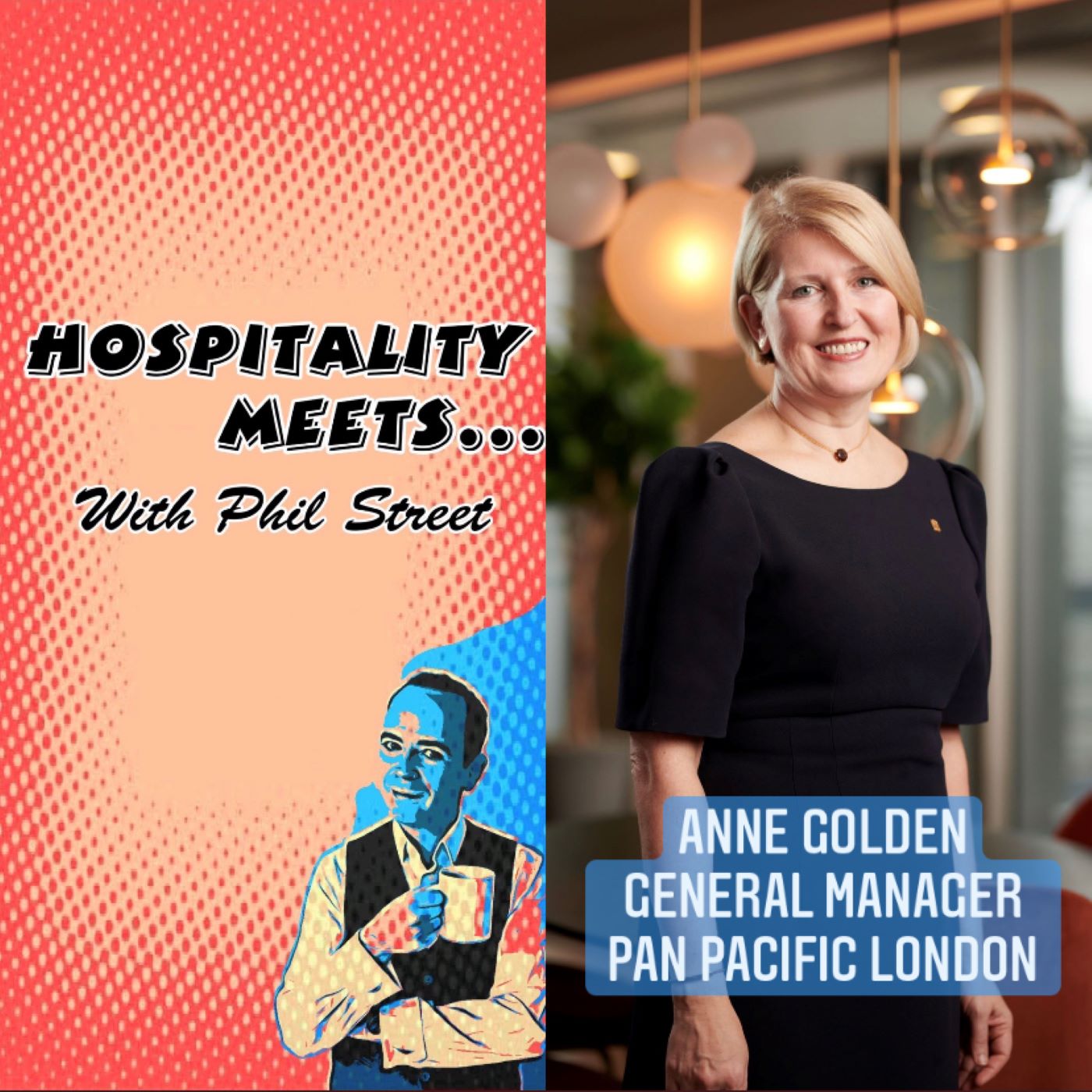#189 - Hospitality Meets Galton Blackiston - Perseverance and Passion in Hospitality

On this weeks Hospitality Meets I was able to get some time with one of my food heroes, Galton Blackiston, Chef Patron of the quite wonderful Morston Hall. He shares his fascinating journey and insights from and amazing career in the hospitality industry so far.
Galton takes us through his early days, starting as a kitchen trainee in the Lake District without any formal culinary education. He reminisces about the tough yet rewarding experience that ultimately led him to become a head chef after a decade of learning.
We dive into the challenges and essential nature of sourcing quality ingredients for his restaurant and the importance of the supplier relationship.
Galton also shares his thoughts on the ever-evolving nature of the hospitality industry, discussing the impact of staff shortages following COVID-19 and the decision to prioritise staff well-being by closing the restaurant on Mondays. He highlights the need for adaptability and innovation, citing examples of young chefs making their mark in Norwich.
And of course we also celebrate Galton's impressive 25-year Michelin star run at Morston Hall along with the story behind it's success.
Throughout the episode, Galton emphasises the importance of understanding business and adapting to change. He also discusses the challenges and opportunities within the hospitality industry, stressing the need for caution in managing staff while recognising the potential for growth and success.
Join us as we explore Galton Blackiston's remarkable journey, from his humble beginnings, to 25 years Michelin through to his thriving fish and chips business, and learn from his wealth of experience in the ever-changing world of hospitality. Galton's focus on quality and innovation shines through. His entrepreneurial spirit is rivalled only by his cheeky sense of humour and passion for the craft.
Enjoy!
The Guest
Galton is the Chef Patron of Morston Hall
Instagram - https://www.instagram.com/chefgaltonb/
The Sponsor
Today’s episode comes to you in partnership with RotaCloud, the people management platform for shift-based teams.
RotaCloud lets managers create and share rotas, record attendance, and manage annual leave in minutes — all from a single, web-based app.
It makes work simple for your team, too, allowing them to check their rotas, request holiday, and even pick up extra shifts straight from their phones.
Try RotaCloud’s time-saving tools today by heading to https://rotacloud.com/phil
This podcast uses the following third-party services for analysis:
Podcorn - https://podcorn.com/privacy
Phil [00:00:00]:
And a huge hospitality meets welcome to Galton Blackiston.
Galton [00:00:03]:
You got it right. You pronounced the name right, is that right? Yeah, most people don't. Right.
Phil [00:00:08]:
Well, I remember, actually, because you and I met for the first time ever earlier this year at HRC.
Galton [00:00:12]:
Yeah.
Phil [00:00:12]:
Which was a phenomenal event.
Galton [00:00:14]:
Yeah, it was.
Phil [00:00:14]:
Really, really loved it. And Claire Bozzy kept calling you Galton, I think.
Galton [00:00:19]:
Yeah, I think I told her. Or not.
Phil [00:00:21]:
You did, yeah, yeah, yeah.
Galton [00:00:22]:
You can imagine I'm the youngest of five boys. Andrew, Nigel, Miles, Jamie and I got fricking Galton. So you can imagine that paired up with my surname.
Phil [00:00:31]:
Did they just run out of names in the end? Is that what it was?
Galton [00:00:34]:
Well, my ancestor is apparently. Well, it is Francis Galton who found out that everyone had individual fingerprints and I got lumbered with this snake.
Phil [00:00:43]:
Wow.
Galton [00:00:43]:
So it's all right. People think, oh, yeah, it's nice. It's a unique. It's too freaking unique.
Phil [00:00:49]:
Well, it served you well. It served you well, everybody. It's a recognizable name. So how are you, anyway? What's new?
Galton [00:00:56]:
I'm really good. Really good. We're cooking really nicely, doing what we do here at Maudston. You know, we play by the seasons all the time and it's an exciting way to cook. I think we are now pretty unique in what we do, in the fact that we change the menu every day of the week.
Phil [00:01:10]:
Do you really?
Galton [00:01:11]:
The whole lot gets changed and I think that's what keeps things exciting. Yeah. I mean, it would be a much easier task if we just kept the same menu. And then I understand that you can hone your skills. Absolutely. Even more. But I like the excitement of what's coming in. What can we use from the garden? What can we use? Which people offer us in particular? Fish and things like that now.
Galton [00:01:34]:
So, yeah, we do have the meat hanging, generally speaking, and we have very good suppliers. You're only as good as your suppliers, and it's up to you not to bugger it up.
Phil [00:01:43]:
Do you know, I remember this just sparked a memory in my memory bank all those years ago when I worked in operations and I worked with the chefs on board cruise ships. This is where I got my start. And they always used to come in and use our photocopier. Bear with me on this. And the photocopier kept on jamming all of the time. And the chef said to me when he was coming in to photocopy his HACCP reports or something like that, he said, photocopiers are like chefs, if you feed them crap produce, in this case, paper they're going to jam. In a chef's case, if you feed them crap ingredients, there's only so much.
Galton [00:02:21]:
I can see where your analogy comes from. I'm not too sure how to put those ones as a comparison, but I see what you're saying.
Phil [00:02:27]:
Yeah, indeed. It's bizarre, isn't it, the things you remember. But there we are.
Galton [00:02:31]:
Yeah.
Phil [00:02:31]:
So talk to us. Actually, we'll come on to Morstan because this is obviously a massive part of your story in any case. So let's go all the way back. I'd love to comment when I was doing some research on you about the fact that I think once upon a time you wanted to be an international cricketer.
Galton [00:02:47]:
I just wanted to be a cricketer. I was born in Norfolk, lived in Norfolk in my first twelve years of life. And our family holidays, because I lived in central Norfolk, would always be coming to north Norfolk, around here to go on holiday for our two weeks. This is before the days when people used to go abroad. This was holiday time. My memories were blissful. Amazing. Two weeks of sunny holidays on this coast here in a little house, actually over in the distance.
Galton [00:03:17]:
If you look from Maulston Quay, you'll see a house in the distance and that's called the watch house. And so our two week holidays were spent over there. The only way you can get to it really was by boat. So we used to hire a little put, put boat with an outboard engine and. Yeah, they were blissful holidays, you know, and stayed in this little house with no electricity. No, nothing like that. But it was just beautiful. Just beautiful, sort of camping with a roof over your head.
Galton [00:03:44]:
Yeah.
Phil [00:03:44]:
Proper landscape.
Galton [00:03:45]:
Yeah. And there were brilliant times. And then my parents, my father got a job in Kent and that's how we then moved from Norfolk to Kent. Huge move. I hated every second of the idea of going from Norfolk to Kent. Right. But actually, when we got settled in Kent, really enjoyed Kent and that's where my love for cricket became really strong and was all right at cricket. But it's a big.
Galton [00:04:09]:
There's a big difference between being or write at cricket or quite good and being professional. It's the same with anything professional, you know. And cricket, in my opinion, about any is more about concentration than anything else, especially if you're an aspiring batsman. I could concentrate for a bit, but then it's like now, still now I'm probably worse now I lose my concentration very quickly in, isn't it? And used to find myself getting out in all sorts of different ways and soon became clear that I wasn't good enough, even though I was, at junior level, recognized by Kent and all that sort of thing.
Phil [00:04:46]:
Yeah. So how were you at school? What was your school life like?
Galton [00:04:52]:
I probably speak for, like, a lot of chefs. I'm not academic. Yeah. And my time was the sort of times when you sort of fell into cooking.
Phil [00:05:00]:
Right.
Galton [00:05:02]:
And you're not academic, so what can you do? As my mum sort of things. And I did a market stall as a 17 year old. I was at academic college. I did a market stall in rye. This is a lovely little Singapore town in Rye. And market used to go on on a Thursday, so I'd make all my homemade produce in the kitchen at home. Cakes, scones, pies, biscuits, you name it, I did it. And always used to use fray bentos mints.
Galton [00:05:34]:
I don't know if spray bentos is still about now, but it used to be anyway. So I used to make all my pastry and all that sort of thing. Have a trestle table set up at pry market and it was called Galton's goodies. And it used to sell out all, every week, it would sell out. Testament to the fact that people still, they did then and still do like, homemade produce on market stalls and things like wi. You always see a. If you ever go to a market and see a wi stall, the kates would be well sought after. And it was a sort of similar thing, I suppose, with me.
Galton [00:06:05]:
And I did that for the best part of a year. Then my parents went and stayed up in the Lake district and got and met a person called John Tovey, who, back in the day was quite a well known character. He owned a hotel called Miller Howe, and they came back and said, you got to apply there because he's looking for a youngster in the Lake district. Yeah, I know.
Phil [00:06:27]:
God, that's a joy.
Galton [00:06:29]:
I had never heard of the Lake district, let alone Windermere. So he went tootling again in the days of handwriting. Resume of yourself.
Phil [00:06:39]:
Yeah. They don't know they're born these days, do they?
Galton [00:06:42]:
No. And he was looking for a youngster to train and the rest of his got the job and started in the kitchen, having never been to college or anything like that, in a school of hard knocks. And that's where I learned. Stayed up in the Lake district ultimately for ten years. That was all right.
Phil [00:06:59]:
Well, right. How was that experience? Because it's your first experience of, I suppose, proper work, as it were.
Galton [00:07:06]:
Yeah, it was.
Phil [00:07:06]:
And, yeah, how was that?
Galton [00:07:08]:
I remember it as being, well, I look back on it really fondly, but at the time, yeah, kitchens are different places to how they are now. The head chef was actually a really nice guy. He still owns a place up in Ulverston, I believe, and he was really nice. But there are others in there, if you. You know, it was a typical kitchen where everyone was in for themselves sort of thing. Yesteryear.
Phil [00:07:32]:
Yeah.
Galton [00:07:33]:
And, yeah, it was quite hard. And John Toby himself was quite hard at times because he was in the kitchen. And if you did something wrong, then you'd have. You'd have. Everyone used to wear clogs then. Wooden clogs.
Phil [00:07:45]:
God, I remember that.
Galton [00:07:46]:
You'd get them chucked at you or clunked over your head or something like that. But it made you. It did. So it was that sort of army trainings that it made you not make mistakes, it made you concentrate. And I started off in the pastry and then finally, eventually moved my way out to head chef. I was in the days again before you stayed at where you used to stay at places and not move around too much. Now it's totally different, of course, but, yeah, happy memories. Happy memories, yeah.
Phil [00:08:13]:
Plus, I think there's a fine line, right, between being a hard place to work versus being a place where you're bullied or whatever.
Galton [00:08:24]:
Yeah.
Phil [00:08:24]:
And I think, you know, we're often. I think certainly, and I've been guilty of this in my own career as well, is that the minute something gets tough is that you look somewhere else. But actually, if you persevere and work through that, as long as you're working with good people who have your best interest in heart, then actually what you take from the other side of that. Yeah, it's.
Galton [00:08:44]:
And also, back in the day when. When I was a youngster, Michelin wasn't really spoken about at all. It isn't like it is now or has been in the last 20 years. It really wasn't. I mean, now it's. Young ones move up for a progression on their careers. Go from, if you're at a one star, you look to go to a two or three star or something like that, then there's real progression. That wasn't about in my.
Galton [00:09:09]:
I mean, Michelin was about. But the knowledge of chefs to move from Michelin to Michelin to Michelin wasn't about so much then. And you just stayed. Yeah. Happy you stayed.
Phil [00:09:21]:
Yeah. So you were there ten years later as head chef.
Galton [00:09:25]:
Luckily, as head chef, then my parents retired back to Blakeney, which is the next village along this coast. And I'd always sort of had hankerings that I wanted to come back to. North Norfolk, up in the Lake district is where I met my wife. Yeah. And this place came up for sale. It's not like it is now, because all the additions of the conservatories and all that are all add ons.
Phil [00:09:47]:
Right, okay.
Galton [00:09:48]:
But, yeah, it was this sort of flinted farmhouse which had been run by a couple who had bought it in the. In the early nineties. In the very early nineties. That's in 1990. Then it was boom and bust time again. So it went from really good. They bought it, having never worked in hospitality before, and then got in the muddle with it. And by the time they wanted to sell it, they were made to sell it as such.
Galton [00:10:12]:
Right. So we bought it from receivers, Harrods receivers, which I didn't know they had that. And it was a sealed bid job and we got it. And I will say now, sealed bid. Yeah, I know it went to seal bids.
Phil [00:10:27]:
Well, there's a sliding doors moment. Imagine if you hadn't.
Galton [00:10:30]:
But I'll tell you this now, but this is 32 years ago, you wouldn't get a one bedroom flat and Blakeney. For what I paid. For what we paid for this. Yeah, but that's the way it is.
Phil [00:10:39]:
Yeah, well, somebody. Somebody's misfortune is somebody else's fortune.
Galton [00:10:43]:
Absolutely, absolutely. They got in the muddle with it. It's like you see it quite often. It still happens. Now, when people think that hospitality is this really exciting industry to go into, which it can be, but you need to know what you're up to. You know, it's a lot harder if you just go into it on a whim and think, oh, I've got a bit of spare money, I'll buy a pub or a restaurant or a hotel. It's hard.
Phil [00:11:07]:
Yeah. Probably harder than it's ever been.
Galton [00:11:09]:
Ever. Ever. We are in such hard times.
Phil [00:11:12]:
Yeah.
Galton [00:11:12]:
Such a. I'm all right because I don't have a mortgage, is what I would say, but I wouldn't want to be straddled with a huge mortgage around my neck.
Phil [00:11:19]:
Rent or rent. Yeah, yeah, yeah. I mean, and that's the thing. We were just talking about that very briefly before we turned the microphone on around. You know, the message of any business, I suppose, not just hospitality, but you've really got to know what you're doing. You can't fudge it now. You might have been able to do it when it was a boom time and everything was under control, but business rates are high. Rents are high, food cost is high, staffing is high.
Phil [00:11:45]:
Yeah. All of these things are high. So you've really, really got to know.
Galton [00:11:50]:
You have to know how to ride the times as well and be able to run a tight ship, you know, because you're so right. Things have changed dramatically even in the last five years since COVID the world's changed immeasurably.
Phil [00:12:06]:
Yeah, yeah. And who knows if it's the same forever.
Galton [00:12:10]:
No, yeah, I agree. I agree. There are some really good things. I think gone are the days now when you. When staff, hopefully they're not doing the 60, 70 hours, probably more back in the day now, you know, our staff get three days off a week, do no more than 40 hours, 45 hours at worst. And that's the way it has to be. And that I'm really pleased about, because you get a real work balance, social life balance, which it should be in my day, one and a half days off, and then even that, you'd go into work on your day off because you just wanted to be ahead of the prep.
Phil [00:12:45]:
Right.
Galton [00:12:45]:
All the time.
Phil [00:12:46]:
Yeah.
Galton [00:12:47]:
Those days have changed.
Phil [00:12:49]:
Yeah. As you say, thankfully, yes. Because I think that balance that you talk about is the thing that ultimately, I think will, in the end, drive stability and maybe we'll find a time in the future whereby, because more businesses are that way minded and focused, like yourself, that you'll then get settled. People who are happy where they are, who feel like they're respected and they've got a lovely place to come work, and you don't have to look for the grass on the outside.
Galton [00:13:16]:
That's right. Yeah. So from that aspect is really good. But you pay more money, you say, for everything. And the only one thing I would say is a shepter party, a Shepta party from ten years ago, if you know what I mean. I'm not sure. Sous chefs. Same thing, right?
Phil [00:13:37]:
Yeah. Don't say that around the ears of your own kitchen.
Galton [00:13:40]:
To be fair, my guys are all good. I have no problems with them.
Phil [00:13:44]:
Yeah.
Galton [00:13:45]:
At all. But they know this place is like a college in many ways, because it's a learning place. You know, we do everything from the basis, you know, we make our own puff pastry, all our pastries, breads, jams, marmalades, everything. So. And we're not big. That big. So you get almost one to one attention each time.
Phil [00:14:06]:
Yeah.
Galton [00:14:06]:
And I love. And I absolutely love my days in the kitchens. Love it.
Phil [00:14:11]:
Yeah, yeah, yeah, yeah. I remember I was talking about this on stage at HRC around, I think the way that you'd prepped the asparagus and the potatoes was, you know, you highlighted the fact that. I don't want to say it's a dying art, but there's less care and attention given to these kind of intricate details on things like preparation for presentation purposes.
Galton [00:14:33]:
Absolutely. Because what I'm so aware of now, because we've had to put our prices up, because all.
Phil [00:14:39]:
Everything's gone up, there's only so much you can absorb.
Galton [00:14:42]:
So to justify all of that, I feel that we have to buy the best ingredients because people expect they won't want a piece of salmon or something like that coming to listen, I could do some nice things of it or do something differently, but I want to give them seasonal produce. And there is nothing nicer than doing a anorfic asparagus or an english asparagus and trimming it up properly so they're all uniform, they're all level, they've all got their ears taken off. And that's not something I would do, but if I was setting up a pub, I wouldn't do it like that.
Phil [00:15:16]:
Yeah.
Galton [00:15:17]:
I just serve it as it is. But here, I think the attention to detail is what sets us apart a bit. You know, I do think that and turning a potato. Nobody can turn a potato in there because I don't do it. But it is an art form in many ways. You know, you have to get that shape correct if you're gonna do it. It's the same with everything. There are some parts of old school which should absolutely remain in a kitchen, and that's the art of making stocks and saucers, in my opinion.
Galton [00:15:46]:
Yeah. You can add your other bits and pieces to it. A lot of stocks now. I see a lot of kitchens putting nori seaweed into their beef stocks and things like that. Veal stocks. And I just see other things going on. But essentially, your building blocks are old school. You can have modern techniques.
Galton [00:16:03]:
Of course you can. And I love the modern techniques. And somebody who I think does it better than anybody is somebody like Gareth Ward. I think his innovation and his cooking style, japanese influence, is something that I love, that I absolutely love.
Phil [00:16:17]:
And the UK has not really seen before.
Galton [00:16:18]:
Look, that's what makes him unique as well. So I absolutely. I love the innovational side, but you also have to cook, to a certain degree, to what your customers like, as such. How do I quantify that? Because I think we are innovative, definitely. I mean, for example, we've got on tonight, for example, we've got the beautiful hand dye scallops on from Orkney, but we're serving it with, like, a thai green coconut sauce on the bottom of it and then we're doing other little bits and garnish on the top of it, which will make it give it quite a thai influence. And I love that. But then I'll also do a hurdwick lamb with a lamb jus for main course. So you mix and match it and that's, you know, I love.
Galton [00:17:03]:
I'm the biggest one to look in cookery books and things like that for new ideas and how people are doing things. And I always start from the back to the front because when I started, it was in pastry. So I always tend to look at the desserts more than anything else to begin with. But I. Yeah, I don't know. I'm only sort of pricking the surface as to what I know and what I'd like to know.
Phil [00:17:28]:
Yeah, but that's the same with everyone, I think. You find the thing that drives you and excites you and that's your road, that's your path. And yes, you might deviate off here and there to. Oh, that's interesting. Maybe we should give that a try.
Galton [00:17:41]:
Exactly that. Exactly that. Just learning. Now, I'd never done inverted puff pastry before, up until a couple of months ago, and then I had it in a restaurant, Johnny Lake's restaurant in London, and I saw this puff pastry was up like this and with all the layers, you could see the layers through it. And it blew my mind that when you put your fork into it or your spoon into it, it disappeared when it went into your mouth. So I've learned how to do it where you put the butter on the outside and then incorporate the. The dough base in the middle, around in the middle of it. And you make puff pastry back to front as such.
Phil [00:18:17]:
Right.
Galton [00:18:17]:
But it doesn't have to make a difference. Yeah, but it takes a bit of getting right.
Phil [00:18:20]:
Yeah, well, that's the thing. Perseverance. Yeah, as well. Anyway, let's get back to your story. This is great, but. So, Morriston, you've got the keys. Yeah, as it were.
Galton [00:18:31]:
And by hook and by crook, we started off with four bedrooms.
Phil [00:18:34]:
Was that more or less from day one ish or did you have some bits and pieces to do?
Galton [00:18:39]:
We did. We bought the. We bought the place in. Can't get this right, November, I think, of 1991, and had up until March to do it up how we felt to do it up. The beauty of Mawson is that the people who had it directly in front of before us. No, not before us, people. Before the people who had it, we bought it off were silversmiths, so they had a lot of money. So whatever they did here, they did it properly.
Galton [00:19:07]:
So, you know, we still have the same oil central heating plant. The windows were all really properly done, so they had money to put to splash out on the place. And that shows I've stayed true to that sort of mantra, that whatever you're spending, you're probably best spending a little bit more because the quality will be better, and that's what we've learned. And actually, you cut your cloth as to what you can afford back then, but now. Yeah, I'd rather go for quality and quantity.
Phil [00:19:39]:
Yeah, I think that's a good mantra for business. Of course, you can only spend what you have, right. But at the same time.
Galton [00:19:46]:
But you end up replacing.
Phil [00:19:47]:
Exactly. It's a false economy, isn't it, in the end for that, yeah. So started welcoming guests pretty quickly and describe what you had. You had four bedrooms, you said, I.
Galton [00:19:57]:
Think, all in the main house, right. But that's the beauty of Morstan, is that we've got the space, and even in the main house, we've now got seven bedrooms in the main house. That's what we started off, the four biggest bedrooms and we added on three more within the house. And then obviously I was on the first intake of greek british menu and I was up against.
Phil [00:20:21]:
So were you. I'd love to talk about that. But you had already established Morrison as a. As a food.
Galton [00:20:28]:
Yes, I suppose so. We opened in 92 and March of 92, then in 1999 was when we got the star. The couple of years previous to that, we'd got a bib Gourmand, which I was under the impression that doing the menu that we do, because I've always done a set menu, always done it and always changed it. I was under the impression that you couldn't really get a mission and start doing this style of cooking that I did. So it was a massive surprise. And in 1999, because Michelin used to get. It was in January, it always just come out in January and we'd got wind of one of the huge newspapers, got wind of that giving a star and, oh, you can imagine it was incredible.
Phil [00:21:12]:
So you literally did not see it coming.
Galton [00:21:14]:
You did not see it coming.
Phil [00:21:16]:
That's the best way, isn't it?
Galton [00:21:17]:
Yeah, it is the best way. And I think, to be fair on Michelin, because I go to the awards every year and I love it, I generally have too much to drink yes, but I love it and it's a real privilege to be asked to go each year.
Phil [00:21:29]:
But it's a proper celebration.
Galton [00:21:30]:
It is a proper celebration.
Phil [00:21:31]:
It's an absolute celebration.
Galton [00:21:33]:
I used to do it really well back in the day. I remember going on a boat in Greenwich, starting off in Greenwich at the Millennium celebrations and they did it on a boat and you get this incredible. You got this incredible lovely, I don't know, thing for the middle of the table from Michelin and mum, champagne 2000. Mum, champagne. That'd be worth a bit of money now I've drunk that. But, yeah, it was a surprise. It was a huge surprise. It really was.
Galton [00:22:03]:
And from there, yeah, it was onwards and upwards, really.
Phil [00:22:07]:
So it was shortly after that that you got the call for great british menu.
Galton [00:22:11]:
That came a little bit after that. I can't remember how long great british menu's been going, but. Been going a long time. But, yes, that was a surprise as well. And they had to do a dummy run and come over here. And obviously it's changed significantly now to how it is back then. In the first intake, it was myself, Nick Nairn.
Phil [00:22:31]:
You're going to drop some nims now, aren't you?
Galton [00:22:33]:
Yeah. Brim Williams, Richard Corrigan, Atul Kucher, Michael Keynes, Marcus Waring.
Phil [00:22:40]:
I remember this. Yeah, I remember watching that.
Galton [00:22:42]:
And it was quite an iconic thing, did it then as a public vote. So used to phone in to put your public vote down, but that soon got stopped for reasons I don't want to go into. But it was a bit interesting, to say the least, because the first year I did it, the mantra was for the Queen's 80th birthday celebrations. So that probably does tell you it must be 20 years ago. And then they got a message from Buckingham palace that the royalty wanted it to be a true representation of Great Britain. As soon as you knew that, you knew there'd be England, Scotland, Ireland and Wales to keep it like that. And so there were four english chefs, Scotsman and Irishman and a Welshman.
Phil [00:23:23]:
Right.
Galton [00:23:24]:
I don't need to tell you any more than that, but what a platform. What a platform. You know, I was. I remember I was up against Mister Worrell Thompson and I too think he came here, bless him, and, yeah, and I went to his restaurant and that's how you did this sort of thing then. But, yeah, it was all right. It was a great platform. And on the back of doing all right at great british menu, we then were able to put six bedrooms down the bottom of the garden, which were extraordinary. You know, and then.
Galton [00:23:57]:
Yeah. And did it again the following year. I was up against SAP Baines that year. Yeah. And sat Baines famously did his 62 degree egg.
Phil [00:24:05]:
Yeah.
Galton [00:24:05]:
Which won him through on that dish.
Phil [00:24:08]:
I mean, you're just competition.
Galton [00:24:11]:
Yeah. And it was a very, very innovative dish at the time. I mean, I have a problem with eggs, so I couldn't eat it. I can't have it when the white is softer than the yolk. Yeah. That's what happens when you put an egg in a water bath.
Phil [00:24:24]:
Right.
Galton [00:24:25]:
You can keep it in there for an hour and a half or whatever, but then you crack it. And that white is snotty.
Phil [00:24:30]:
Right. Yeah. Not to everybody's taste.
Galton [00:24:32]:
No. If you got a, like, extra like that one. But there we are. But it was a brilliant platform. And then on the back of that market kitchen and Saturday kitchen, and then moved on with my mate from Yorkshire. Now, I've been doing the program with him for a few years and. Yeah, I know the importance of your face being shown on television programs. You know, I've never yearned to be a regular on or anything like that.
Galton [00:24:57]:
I wouldn't say no, necessarily. But I think James and I could be quite entertaining at some times.
Phil [00:25:02]:
No doubt.
Galton [00:25:02]:
As long as he listens to me.
Phil [00:25:04]:
It'S never going to happen, is it?
Galton [00:25:06]:
No, exactly.
Phil [00:25:07]:
He won't listen. But that's. To me, when you said yes to coming on this show, that was one of the reasons why. I mean, I've watched you on television since I've started getting into food, and I've always found you to be. I just think you've got a wicked sense of humor and there's almost like. And please don't take this the wrong way. This is meant as a compliment. There's almost no filter.
Phil [00:25:29]:
It's like what you see is what you get.
Galton [00:25:30]:
Yeah, you're right. You're right, it is. That's probably why it's a good thing that I came off Saturday, kitchen on BBC, because that is live.
Phil [00:25:37]:
Right.
Galton [00:25:38]:
You never know what's coming out of my mouth.
Phil [00:25:40]:
Right. Yeah.
Galton [00:25:41]:
And that was one of the problems. Yeah. I remember one time, I got to tell you this, that I was on, and I think it was either Tom Kerridge guest presenting, or Glyn Purnell. I can't remember which one it was. And I was doing wild sea bass. And we literally, at this time of year, it doesn't happen so much now, but the local fishermen go out in their boats with a net and trawl it round, and our sea bass are really heavily protected. You can't do that.
Phil [00:26:06]:
Yeah.
Galton [00:26:07]:
And they used to come to the back and I'd get a knock on the back door, they'd have these incredible sea bass. You'd pay cash and you wouldn't ask questions. Well, of course I said that on Saturday, kitchen.
Phil [00:26:17]:
Right live.
Galton [00:26:18]:
And I have it into my ear. Amanda. Amanda Ross, who's the lady who owns the program, said to me, galton, you shouldn't say that. Literally, on that Monday morning, I was hauled in front of the fisheries of Lowestoft in Norfolk to say that. You can't say that. I said, well, it happened, you know, and I'm best taking it rather than a little pub or deep fry it or something. But, no, I realized it was the wrong thing to say.
Phil [00:26:43]:
Yeah, yeah, yeah. That must stop you in your tracks when you're in the midst of doing.
Galton [00:26:50]:
Yeah, it did, sort of. I then had to make an apology at the end of the show, I think, to remember. Right. But it's all innocent, but, yeah, I was just telling it as it was back at that time.
Phil [00:27:01]:
Yeah, yeah, yeah, yeah. So back to Marston. The evolution has begun. At this point, you've added in the bedrooms. How is the. At that time, how big is the dining room? How many covers are you doing?
Galton [00:27:13]:
Right, so we have. This has stood true for most of our time here at Maulston. We have 19 tables that could be 19 twos or it could be 19 fours, effectively. So we hover between 40 and 50 sometimes, although this year is quite interesting because we either have boom or bust times. It's just the way it is. Yeah. And I've always sort of. I don't want to be a numbers game, I really don't.
Galton [00:27:37]:
But obviously you've got to take the month, you've got to take the money where it's available. Yeah, you know.
Phil [00:27:42]:
Yeah, I. Absolutely. And so it stayed much the same through till.
Galton [00:27:47]:
Yeah, basically, I mean, the menu has expanded in our years. We used to be a four course set menu. Now it's, I think by the time you've had canapes and everything like that, it's sort of nine stroke ten courses. Some people include breads in that, but I don't include bread. But some. Some places do as a course, but, yeah, I don't want to get any bigger.
Phil [00:28:08]:
Yep.
Galton [00:28:08]:
But I like the. I like the variety in the way we do things. We do two different types of bread and they change every night. Two different types of butter, they change every night. So, you know, attention to detail is quite good.
Phil [00:28:22]:
Yeah. That feeds right into the whole message about doing business well though, doesn't it? As well in terms of, especially as you say, you're what would be deemed in the luxury space. So people have an expectation level, don't they?
Galton [00:28:36]:
Do.
Phil [00:28:36]:
Whether you're a. You're absolutely loaded and you can afford to eat like this every night or whether you've saved up to come for.
Galton [00:28:42]:
Your anniversary, you're absolutely. And we get all sections, you know, I did. I didn't tell you about. Because after. Also after great british menu and the success of all of that sort of thing, my passion is sport, is Norwich City, bless them.
Phil [00:28:58]:
Pleasure.
Galton [00:28:59]:
Yeah, I'm a seasoned ticket older there and all that stuff.
Phil [00:29:02]:
Well, it's just down the road, isn't it, really?
Galton [00:29:03]:
Yeah, it is. And I love the football, I love the release valve football gives me when I go to watch it on a Saturday afternoon, get back to service. Although when we're in the Premier League, times changed all over the place, which became a nightmare to actually go and watch. There's no 04:00 on a Saturday afternoon anyway. So I was sitting watching Norwich play, this is over ten years ago, and somebody said to me, would you ever do another Morrisden along the coast or anything like that? I get asked that one quite a lot still, but my answer immediately is always, well, never say never. But the only problem is with doing a Mawston. It's going to cost me a million plus to do renovations and that's not buying the place, probably. I'd rather do fish and chips.
Galton [00:29:48]:
And within six months of that, along came number one, Chroma.
Phil [00:29:53]:
Was that. Did that then happen a little bit by accident? Was it something you had in your mind or just.
Galton [00:29:59]:
I'd always had it in mind. I don't know why I. I've always had it in mind that I thought fish and chips could marry up really nicely with what I do because it's totally different and what it's turned out to be is an incredible business, that one. In the sleepy little town of Cromer, you know, we now have 60 plus staff there.
Phil [00:30:18]:
Really?
Galton [00:30:19]:
It's incredible thing. It's on three floors and it's huge.
Phil [00:30:22]:
Yeah.
Galton [00:30:22]:
The views all overlook the sea and Chroma Pierdez and you look at Cromer and you think, this is this tiny little town, but famous for crab, isn't it? Yeah, famous for crab, yeah. Why is it. Why is it so successful? I just feel that purely by accident, you've got on the left hand side a mile away, is huge. Caravan sites, all overlooking the sea and on the right hand side from overstrand back towards Chroma. Again, massive caravan sites and everybody sort of filters into chroma and the first place they see is number one. But it does go really well all year round now because of the pier. The pier show is so popular. You have a summer pier show, you have a Christmas pier show, right? So you now get business all year round.
Phil [00:31:14]:
Fish and chips is our season less.
Galton [00:31:17]:
Yeah. And the beauty of it is that I don't have the be there. It runs pretty. There are so many drama dramas there, but most of the time you get a decent team in the kitchen, a decent team out front, you know, decent managers and people like that. The guts of the place is a takeaway. That's the one which really churns things out, which is amazing. You know, we. I think our record once was last year, actually.
Galton [00:31:45]:
We did over 2200 in one day. Fish. Now that could be just fish and chip. That could be just chips. Fish and chips, right.
Phil [00:31:51]:
But regardless, you can imagine we have.
Galton [00:31:53]:
Eight pans on the main prior and they're going. One kept specifically for gluten free intolerances and things like that.
Phil [00:32:01]:
Right.
Galton [00:32:02]:
But it's a machine. It's a brilliant machine and I love every bit of it because we know we. Not now, we always source the best cod. Havoc. In fact, back in the day when we first started, I had this fanciful idea that we'd only use wet fish caught from the North Sea. You can imagine after, when we first.
Phil [00:32:20]:
Opened for three days, you thought, no.
Galton [00:32:23]:
Yeah, we had to. We had to close because we were just in. The kitchen was piled higher. These boxes of cod had it in place in ice. You can imagine by the time you got around to them, the ice was all melted on the floor and everything because you just didn't have time. You were churning out taking one box. Right, we'll do that. Do that.
Galton [00:32:38]:
We had to close them in 2 hours. So then I. I got in touch with Mister Stein down in Padstow and said, how do you do it?
Phil [00:32:45]:
He's got some experience with fish.
Galton [00:32:47]:
Exactly that. How do you do it? And he buys. I don't know if he does now, but he did then buys his icelandic cod and we do the same. We have a boat which I can name which goes out and we have 40 tonnes of. We buy our fish price at the beginning of the year so it doesn't fluctuate. So we say, right, we want a minimum of 40 tonnes of this. My life, 20 tons of haddock, ten tons of place. And that's the way you can keep a settled price.
Galton [00:33:17]:
Right.
Phil [00:33:17]:
How do you. How does that get stored, then? Or is it a case of. It's.
Galton [00:33:20]:
We don't have it at wallet and we have your quarter. Yeah.
Phil [00:33:24]:
Right.
Galton [00:33:24]:
They know that they're fishing and that will take that much.
Phil [00:33:27]:
Right.
Galton [00:33:28]:
So almost 70 ton of fish.
Phil [00:33:29]:
Yeah.
Galton [00:33:30]:
In a year, that will take.
Phil [00:33:32]:
But once again, there's a couple of things to unpack here, actually. Once again, you're highlighting the importance of that supply relationship.
Galton [00:33:38]:
Yeah.
Phil [00:33:39]:
Two, my guess is that once again, you'll have this focus on quality, because let's face it, whoever you are in the world, there's always time for a really good fish and chips, right?
Galton [00:33:48]:
Oh, absolutely. It's the nation's favorite. Yeah, it really is the nation's favorite. And if you can have fish and chips overlooking the sea.
Phil [00:33:56]:
Even better.
Galton [00:33:57]:
Even better. Even better. And, yeah, you're absolutely right. We inherited, when we took on the place at Cromer, the guy before I bought fish from Russia, I think it was, because obviously not. That was a cheaper variety of fish. So we changed that and now we can go out on the boat, go to Iceland, and they'll take us out on the boat and see this incredibly millions of pounds worth of fishing boat. With all the technical. It's incredible.
Galton [00:34:28]:
I've seen it.
Phil [00:34:30]:
That's a great experience as well.
Galton [00:34:32]:
That is a great experience. I love going over to Iceland. I think Iceland is brilliant for food as well. But anyway, all the fish are then frozen at sea. And I tell you, I can put the best piece of cod caught from the north Sea against the piece of cod which was frozen at sea. I don't want you to tell the difference. I really don't. So the produce is massive.
Galton [00:34:50]:
The things I learn about so much is different times of the year, the different sugar qualities and quantities in potatoes, and the different varieties which are better for frying at different times a year. Obviously, we're now just now on new season, new potatoes, which are great, the best to fry with. But as you can come into November, December, January, you have to use a stored potato. So the fen potatoes are really good. And different varieties hold different sugar quantities and starches, so. Yeah. And some cook up better than others. And bearing in mind that we go through in the summer, two tons of potatoes a day.
Galton [00:35:26]:
That's a lot. 60 odd bags.
Phil [00:35:28]:
Yeah.
Galton [00:35:29]:
Potatoes.
Phil [00:35:29]:
And you're just one business.
Galton [00:35:31]:
Yeah.
Phil [00:35:32]:
As well. Imagine. Wow. Yeah.
Galton [00:35:34]:
It is a fairly unique one, I must admit. But we also do all sorts of other things. Obviously, we feature the crown of crab, lobster, oysters, if you want oysters, brankos or oysters, which are brilliant. We do it all.
Phil [00:35:44]:
Yeah. The other thing that I wanted to unpack about this section of your, your journey is kind of exactly the story that you highlighted about having the boxes and boxes stacked upon each other. One, the business has almost happened by accident, but two, you've gone into a business that you don't really truly understand. But for me, that's a really exciting message as well, because I remember even when I launched this humble little podcast, I had a chat with somebody who had a very successful podcast. What should I do? What do I need to get in play? And he just said to me, just get it launched and worry about perfection later. And it's a really good mantra for business. Okay. Yes, you need to have a plan of some kind, but plans get changed.
Phil [00:36:27]:
Right. Things get ripped up and you've got a. Your idea could have started off on one track, but actually very quickly, you kind of highlight that. You've got a change track.
Galton [00:36:36]:
Yeah, yeah. That person is right. Yeah. Have you got an idea? And I've thought many a times, because we now close, we need you serve them seven days a week. But now, because of staffing levels since coming out of COVID because you went from immediately after Covid, we were stacked like the rest of the country was. We were absolutely. Champagne was the biggest seller. Our Mawson hall champagne.
Galton [00:37:00]:
You couldn't keep up with it. People were desperate to go out, desperate to really enjoy themselves because they've been cooped up for a long period of time. And then with that, then became very quickly staff burnout staff. Yeah. And then staff were thinking, well, we've had this much time off. We did nothing or very little. And actually, they looked at alternative industries to go into and things like that. So we then became very busy and then very quickly short staffed.
Galton [00:37:33]:
And so it became, you know, the only thing I could really do is to. Is to shut a day, which, which was really alien to me.
Phil [00:37:44]:
Yeah.
Galton [00:37:44]:
But now I absolutely love the fact that we shut on a Monday. It gives you a chance to breathe. It means you can come back on the Tuesday and just ease yourself into everything again. And I really like it. I like the time. And as I say, the world has changed. And I like the fact that we close on a Monday now. I really do.
Phil [00:38:02]:
Yeah, yeah, yeah, yeah. But I mean, that's. That's part of the evolution of business. Right. You can't do the same things forever.
Galton [00:38:09]:
Yeah.
Phil [00:38:09]:
You've got to adapt to what's going.
Galton [00:38:11]:
On around sort of icons of mine would be the guys at the waterside at Bere and Ann Roum, the late, great Michel Rue senior.
Phil [00:38:19]:
Yeah.
Galton [00:38:20]:
And they close two days a week now.
Phil [00:38:23]:
Yeah. Who'd ever thought that, right?
Galton [00:38:25]:
No. Who would ever fought that? North Cope manor do and who had ever fought that? And I just think, yeah, you have to listen to these people and see what they're doing and realize that there's a reason why you're doing it. Yes. It's a margin taken off the bottom line, but sometimes we all have to just accept that. You just have to take that, take that hit for the benefit of the place, actually.
Phil [00:38:48]:
Yeah. That's what being. What being an entrepreneur is all about, isn't it? About understanding your own business, where it sits in the world and how you change and adapt to the times you're in.
Galton [00:39:00]:
No, exactly that. And now on a Monday, it gives me a chance to think about whether I want to do a podcast or anything because I think it'd be quite entertaining. But I don't know about how to do it. But I'm quite interested. I did when, during lockdown, I did something from home with my son, youngest son, and it was quite entertaining, I think, because he, or still isn't into cooking at all. But just getting into trying to get an interest in cooking became quite entertaining. But I'd love to have the time to actually do something because I think there is something to be learned by doing the skills properly. But, you know, and if I can do it, anyone can do it, but that's for the future.
Phil [00:39:40]:
Bless you. Yeah. Well, where do you think your entrepreneurial spirit came from?
Galton [00:39:44]:
Cause I weren't any good at anything else, really.
Phil [00:39:46]:
Simple as that. Yeah. Was there any inspirational figures?
Galton [00:39:49]:
I don't look at myself as being entrepreneurial. I look at myself that I met my ex wife up in the Lake district. We stayed there for a long time, came back to do our own business. Was that entrepreneurial? I suppose it is. And then, yeah, as luck would have it, Chromaphine came along. We've got business partner in the chroma thing who fortunately is very like minded and very hands on. And I think that's quite important if you're going to have a business partner, you don't want a sleeping business partner as such. You want a business partner who's willing to get their hands dirty and that sort of works.
Phil [00:40:21]:
Yeah, yeah, yeah, yeah, yeah. Conscious of your time.
Galton [00:40:24]:
Yeah.
Phil [00:40:25]:
Oh, yeah. Crikey yeah. They go quick, don't they? I know, yeah. But a final couple of questions, then, before I let you get on your merry way. What's next? What's.
Galton [00:40:34]:
Great question. I think the day that I actually get tired of cooking is the day for me to call it a day.
Phil [00:40:41]:
Right.
Galton [00:40:42]:
I don't get tired of cooking. I love the modern techniques and innovations on it. I've just bought myself an aero machine, for example, because I like the idea, but I've just bought myself a new juicing machine, so I can do solids and things like that, make different things of olives. But what is next? I'd always say that I'd like number one to go further than it is and there are plans afoot which I can't talk about as yet. I like Maulston Hall. I don't want to expand Morstan Hall. I want to just be this beautiful haven of luxury. Small luxury definitely created that.
Galton [00:41:14]:
And I just. I don't know. Is there a. Is there a never say never? I made a mistake with one of my books to do fish only. It's a great book and it won all the sort of prizes for being all about fish, but it pigeonholed. You know, if you're going to do a book again, it has to have a dessert, fish main, veg and all.
Phil [00:41:36]:
That sort of thing. Otherwise people just think you're a fish guy.
Galton [00:41:38]:
Yes. Not everybody. As much as I think everybody loves fish, they don't. So it sort of pigeonholes you a little bit. But it's a great book and I've never say never to another book. Sort of highlighting the time after Covid.
Phil [00:41:52]:
Yeah.
Galton [00:41:52]:
Which have been so interesting, so, so different, you know, just, you know, bang on about staff. You need staff, and we have, fortunately, good ones. But I can't have a one to one meeting. I have to have somebody with me just in case it gets misconstrued or whatever happens like that.
Phil [00:42:10]:
Yeah.
Galton [00:42:10]:
You know, and that's the way the world has changed. I can't. I have to be careful when I give somebody a bollock in the kitchen, otherwise the mental health comes out.
Phil [00:42:17]:
Yeah.
Galton [00:42:18]:
I can't do it. I have to be careful. And, you know, like, I always have said that kitchens are hothouses generally, and things get set in the heat of the moment, but it's only once it's said and once it's done, finish, forget.
Phil [00:42:34]:
Yeah.
Galton [00:42:34]:
And just learn from it. Yeah. And, you know, I want the kitchen always to have the mantra. You're trying to do the very best you can. You're not cutting a corner. Don't cut a corner.
Phil [00:42:44]:
Yeah. And sometimes, as you say, things just, you know, get a tiny bit out of hand. But, yeah, I think generally, if the intention is a positive one.
Galton [00:42:53]:
Yeah.
Phil [00:42:53]:
Like you're trying to make somebody better.
Galton [00:42:55]:
Yeah.
Phil [00:42:56]:
For their own good.
Galton [00:42:57]:
Yeah.
Phil [00:42:57]:
As well as your own business is good and everybody's good, then, you know, I think people can forgive and forget quickly.
Galton [00:43:03]:
Yeah, you'd hope so. But the world has changed and you have to be very careful now. Very careful. I never used to have an HR company just to make sure I'm doing things right, because back in my day. Yeah, it was different.
Phil [00:43:17]:
Yes. There was different HR methods back then, for sure. Final question, very quickly. We've spoken, obviously, a bit around the challenges of the industry, but I think we probably both agree that it's still ridiculously amazing industry. What would be your kind of three main reasons as to why somebody should come into hospitality as a career?
Galton [00:43:36]:
It is still a brilliant industry. Absolutely. Because the rewards are there. If you're going to put the hard yards in, they're definitely there. We've been really fortunate at Maulston. Maulston has spawned some incredible chefs and front of house guys. One's just down the road. Greg, who's got a Michelin star, got a Michelin star in his first year at Metasuite in Holt, which is amazing.
Galton [00:44:02]:
Another young lad who's now working in Norway, he got his first star, and he came to me as a youngster. Kate, who's been on this year's GBM, she got to be head chef at, I think. I don't know if it was Franz and all the others.
Phil [00:44:17]:
That's right, yeah. One of the scandinavian powerhouses.
Galton [00:44:21]:
Great, kidde. Yeah. And she started off as a youngster here, Richard Bainbridge and Norwich. You know, he hasn't got a star, but he's still a great place. Danny swan at Ingham, all great chefs and gone down their way of doing things. And if you've got the ambition, you've got the drive, then it can be very exciting. You really have. And so that's, to me, the main thing is that you've got to have the passion.
Galton [00:44:47]:
You've got to have that passion to do it. And it can be such a rewarding industry, such. It doesn't matter. You know, my world has been changed. Even this year, when we put a bar in there that I've now got a mixologist. Two years ago, I'd have told you, absolutely not. That's not Morston. This mixologist creates the most incredible cocktails.
Galton [00:45:10]:
And I think I'm a good judge on a cocktail, maybe because I have a lot of them, but I never.
Phil [00:45:14]:
Used to practice me, it's perfect.
Galton [00:45:16]:
But I just think this is such an important part of the experience of going out now is if somebody wants a cocktail, you make it a bloody good cocktail and you give it the frills and the spills and the service with it. And I love that side of things. And there's things that are moving all the time in the methods of cooking and all of that, which I'm really. I enjoy, I enjoy seeing, so that's what. Yeah. And it's the only thing I half know what I'm on about, is cooking side of things. And I love it. Yeah.
Phil [00:45:46]:
Wow. No, please continue to love it. And thank you very much for your time and thank you for coming over. My absolute pleasure. What a stunning, stunning place you have. It's just a shame the sun's not out today. It looked even better, but, no, I think what you've done here is quite remarkable. How many years? Mission star now?
Galton [00:46:03]:
Oh, Michelin star, 25.
Phil [00:46:04]:
Yeah. I mean, yeah. You don't do that out of luck.
Galton [00:46:07]:
No.
Phil [00:46:08]:
So, no. Thank you so much, Galton.
Galton [00:46:09]:
Oh, it's a pleasure. Thank you.
Phil [00:46:10]:
All the best.
Galton [00:46:11]:
Thank you.
Phil [00:46:12]:
Cheers. Pleasure.














